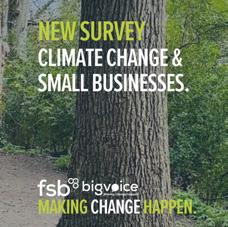
4 minute read
Helping our members with good business practice and carbon reduction
Small businesses are embedded in our communities and many do so much good for their employees, supply chains and for the planet. This is not often recognised or celebrated, therefore FSB worked with the Good Business Charter to adapt the Charter to be suitable for small businesses, creating the new Good Small Business Charter.
Small businesses need to play a huge role in achieving carbon net zero ambitions. FSB made it clear to Government that its approach to net zero policymaking must be underpinned by five fair values – or principles – that will enable and inspire smaller businesses to take actions:
1. Ambition
Climate change policies must be ambitious enough to have definite impact on the climate change challenge, both in their timescales and their scope and they must be informed by the latest scientific evidence.
2. Accountability
Government, alongside regulators, should provide clear and accountable governance and ensure that climate change policies are coordinated.
3. Diversity of delivery
Government should support, empower, and incentivise smaller businesses to find their own ways to net zero targets, acknowledging that a one-size-fits-all approach to policy delivery may not work; and that a diverse set of business-led solutions and incentives will be needed.
4. Opportunity
Government must provide a level playing field, ensuring businesses of all sizes, in all sectors, across every region and nation, can contribute to a net zero economy through their innovations, their investments, and their markets.
5. Cost
Government climate change policies must be affordable and achievable. The costs of transition to net zero must be distributed fairly among businesses, workers, and consumers, based on their environmental impact; their ability to pay; their ability to adapt and the potential for gain.
Member story: The Wellbeing Farm, Bolton
FSB Member | Celia Gaze The Wellbeing Farm is a fun, quirky and ‘magical’ events venue that prides itself on sustainability, zero carbon and business-for-good principles. The venue has implemented a stringent COVID-19 plan to ensure it is secure.
Founder Celia Gaze started the business several years ago when she had had enough of being a stressed-out new mum working at a senior position in the NHS. From that moment, Celia vowed never again to have regrets and to always make the most of her life. She went on to transform a dilapidated barn into a wedding and events venue: The Wellbeing Farm.
Corporate social responsibility is at the heart of the business. It uses self-sufficient methods, such as use of a wind turbine and is working towards a zero single-use plastic policy. The business now strives to be one of the most sustainable green and carbon-neutral venues in the UK. In 2021, it became a signatory of the Good Business Charter, following FSB’s work with the Charter to devise a scheme suitable for smaller businesses. It is also working towards becoming one of the first UK hospitality businesses to become B Corp certified, which means meeting rigorous social and environmental standards.
The business model is paying off: “Millennials seek out socially conscious brands; investors look for organisations that impact environmental and social change; global consumers will pay more for sustainable products and practices and potential employees seek out employers that reflect their values,” said Celia.
We love supporting the local economy and developing young people who work at the farm. We’re enthusiastic about working with wellbeing providers to raise wellbeing to the highest priority in Lancashire and we’re committed to doing our part in preserving the future of the planet.

The Wellbeing Farm, Bolton

Member story: The Impact Guru
Esther Stanhope first set up her business, The Impact Guru, in 2013, having previously had a successful career as a senior producer at the BBC. Her aim was to turn her passion for helping people to find their voices into a successful business, inspiring and guiding clients on how to make an impact and become more confident and charismatic with their public speaking – for presentations, pitches, or potential promotions. Her watchword is “Oomph!”
She built a strong client base across the UK and globally, leading in-person coaching in boardrooms, meetings rooms, and auditoriums; as well as becoming a successful author on the subject. Then the pandemic hit and in March 2020 it went from a full diary to zero bookings. “All my public speaking events were cancelled all over the world,” says Esther. But she successfully pivoted and went from a guru of in-person public speaking to a guru of virtual presentation.
FSB Member | Esther Stanhope

Everything looked doom and gloom as COVID hit. Speakers, like me, took a heavy beating with the overnight collapse of the event industry. Yet here we are…not only did I manage to get my business back on track but, by a lot of hard work, pivoting and re-planning I managed to grow and expand.
“I forced myself to embrace virtual meetings and events,” says Esther. “It wasn’t easy. I wasn’t 100 per cent comfortable in front of the camera! I really had to stretch my comfort zone to the max. Before, I helped senior leaders to be more charismatic during boardroom meetings. Now, I help them to make an impact on Zoom and Teams.”
FINANCIAL STATEMENTS
Group Strategic Report, Report of the Directors and Consolidated Financial Statements for the Year Ended 30 September 2021
for









